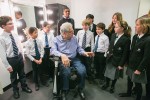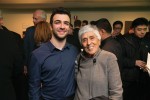Column Name
Title
Juilliard in Chicago
Juilliard had a number of Windy City moments in January. The Juilliard Orchestra, back in Chicago after a 10-year hiatus, had its Harris Theater debut under faculty member Itzhak Perlman ('68, violin). The sold-out concert was a repeat of the ensemble's December 14 performance at Geffen (formerly Avery Fisher) Hall; both featured second-year cellist Edvard Pogossian as soloist. Just prior to the Harris performance, Dean Ara Guzelimian gave a brief but moving tribute to Pierre Boulez, who had died the day before.
Top left: Juilliard administrators and musicians saw the new Juilliard- and Nord Anglia-developed curriculum in action. <em>Pictured: </em>Elizabeth Hurley, vice president for development and public affairs, and Joseph W. Polisi, president, at the British International School of Chicago.
(Photo by Todd Rosenberg)Some students from the British International School of Chicago had a chance to go backstage at the Harris Theater after a Juilliard Orchestra rehearsal to meet with Itzhak Perlman.
(Photo by Todd Rosenberg)Body
While they were in town for the concert, members of the administration and some of the musicians traveled to the British International Schools of Chicago in the South Loop and Lincoln Park to perform for and meet with students and teachers. Juilliard is creating a K-12 embedded performing arts curriculum with Nord Anglia Education, which operates the two schools. Ten of the students also had a chance to go to Harris after one of the orchestra's rehearsals and meet with Perlman and some of the Juilliard Orchestra members.
Why Bach?
Two or three years ago, while having lunch with Samuel Adler (faculty 1996-2014) and Derek Bermel, I mentioned that numerous composers say Bach is their favorite composer, and I asked for their thoughts. Sam immediately answered, “Whether or not he was the favorite composer, he was the greatest one.” It is of particular interest to note that Beethoven, not often given to praise, referred to Bach as “the father of harmony.” Brahms and Bartók, among many others, paid homage to Bach.
Why Bach? I believe that no one has ever depicted the human spirit through music more deeply. I often compare him to Shakespeare: Styles and language may change, costumes may change, stagecraft may change, but his words and characterizations are forever. So too with the music of Johann Sebastian Bach. Whether it's written in a sacred or secular mode, vocal or instrumental, serious or lighthearted—and whether it's played on original instruments or ones that didn't exist in his lifetime— Bach's music speaks of eternal truth.
Bach is a requirement at virtually all string and keyboard competitions and auditions. This may indeed be a reason to study his music, one that leads to dutiful and often sterile performances. But it seems to me that the fundamental and overriding reason for studying Bach is to seek an understanding of what he is saying, his deeply felt religious convictions, his frequent reference to numbers and their architectural relationships. His music, although complex, speaks emotionally to the audience in simple terms. Perhaps most importantly, to know Bach is to be forever inspired by him. That is why Bach. —Violin and chamber music faculty member Lewis Kaplan (BS '58, MS '60, violin) is the director of the new Portland (Me.) Bach Festival
Programs Now Available Online
While a well-written concert program can be an invaluable supplement to the performing arts experience, it's rare to fully appreciate them in the moment. Reading them carefully right away distracts from the performance, but saving them for later creates clutter. To give Juilliard's concert programs some help in this arena, a number of programs for the 2014-15 and 2015-16 seasons are now archived online. While certain programs have long been available via the online events calendar, this is the first time programs have been available in one central location. The archive provides basic information about each event and a link to download the complete program as a PDF.
The archive's value extends far beyond the chance to learn about a favorite concert. Even non-concertgoers can enjoy a trove of music analysis, dramaturgy, and other special features: for instance, the pages of anecdotes, photos, and tributes from this past October's Vincent Persichetti tribute; the composers' remarks about their pieces being premiered by the New Juilliard Ensemble last spring; the history of Yasmina Reza's God of Carnage, which Juilliard Drama presented in October; or translations of the Liszt art songs that were performed at December's Songfest. Start browsing at juilliard.edu/program-notes-archive. —Jessica Liese, Digital Content Manager







